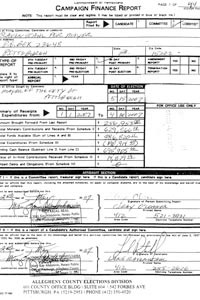Here's a story that sums up the local political climate nicely.
For years, Pittsburgh voters have been unable to go online and find out who is contributing to local candidates -- information that has long been available on the Internet for state and federal candidates. But thanks in part to tardy action by the county government, Pittsburgh voters will now have not one but two sources of online data up and running in time for the May 19 primary.
And while filings from the Pittsburgh City Controller's office will be much better than what the county is about to roll out, neither will deliver all the information voters are likely to want.
At a special Pittsburgh City Council meeting March 24 on campaign-finance reform, Allegheny County Council President Rich Fitzgerald said the county would begin posting campaign-finance reports online by the middle of May. The first such reports to be posted will be "second Friday pre-election" reports, which cover contributions made from the beginning of the year through May 4. It will include finance reports submitted in all county, school-board and municipal races within Allegheny County.
While the data will be posted in time for residents to consult before voting, it misses a county-imposed deadline by more than two years. In August 2003, county council passed a bill requiring such reports to be posted online by January 2007. The county ordinance also required that "Web access" to the information "shall include a searchable database."
But according to Kathy Guzzi, manager of expense accounts and absentee ballots with the county elections division, the county plans to simply scan the forms turned in by candidates, posting the images as PDF documents. Those documents will resemble the paper filings, but it will not be possible to search them by contributor. To measure a given donor's influence, a user would have to search every candidate's filings, one by one.
Guzzi says the legislation's searchability requirement will be satisfied because users can search by candidate. As for creating a function to search by donors, Guzzi says the county "is not planning that."
"We have been working on this since last year and this will satisfy the legislation," Guzzi says.
James Browning, the associate director for development with Common Cause Pa., says the city of Philadelphia also uses the PDF system and says it's a "complete failure." By contrast, during his time as director of Common Cause in Maryland, he says, a completely searchable system was instituted there. Once a user put in search parameters, the desired information would be gathered in less than a minute.
"Putting up PDFs makes it difficult for the public, is not truly searchable and is not at all helpful," says Browning. "Add to that the fact that they've had since 2003 to get this information online and it's disingenuous to say you've run out of time to get this stuff up there."
Fitzgerald noted that the procedure will be a huge undertaking because it includes all municipalities in the county. "We're talking about 130 municipalities," Fitzgerald says. "That's a lot of folks."
Meanwhile, the city controller plans to establish a contributions database for city office-seekers only -- and this one will be searchable.
In December, City Controller Michael Lamb pledged to begin posting both city-contract awards and campaign contributions given to city officials. Lamb's pledge came amid a still-raging "pay to play" controversy, in which critics alleged campaign contributors were often awarded contracts by city officials.
Lamb's office has been focused on getting the contracts online, and Lamb promises that his office will start posting campaign contributions one week before the primary.
"We're not just going to put a PDF up," says Lamb. "We've been working diligently to get the contracts up in a way that's searchable by vendor and department. That's where we've been focused, because to me that's more important."
As with the contracts, Lamb says it's also a priority to make sure that the campaign contributions are also completely searchable by candidate and donor.
Even so, information will be limited. Early on, it will include only candidates up for election this year. By the time of the primary, users will be able to search only a mandatory city filing that includes contributions received both during the second-Friday pre-election report and for a week past it.
Contributions made in 2008 will not be available online until after the primary. That means voters will have a hard time getting a full picture of contributions made to, say, Mayor Luke Ravenstahl -- who raised roughly $1 million before 2009 began. Allegations surrounding contributions to Ravenstahl have been at the heart of the "pay to play" controversy.
"Once the system is up and running, we'll be able to see what the turnaround is to get this information posted," Lamb said. "After the primary, we'll go in and backload the data, but with the amount of information there is to deal with, there's just no way we can get it all in before the primary."
A single campaign-finance report can contain hundreds of entries, and Lamb points out that the process of entering contributions is time-consuming. After the primary, he says, his office will continue posting annual contribution reports for all city officials, not just those running for office this year.
Common Cause's Browning says Allegheny County must follow suit and that a complete, searchable database is the only way to comply with the county's law.
"It's almost hostile to simply put up a PDF and expect the public to spend hundreds of hours poring through them," says Browning. "This information needs to be put online in a meaningful way because it's going to be the key to every future issue.
"The ability to get to this information is how future scandals will be discovered. Or, unfortunately, are not discovered."















